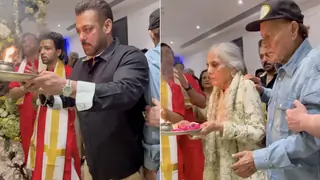My interest in LTL has never bordered on the predictive aspect of this love story but rather its power to enthrall so many viewers for its novel concept of the "kind" and "generous" Don and the unfortunate poor girl ostracized by the society because of her appearance which was a curse whichever way she chose to flip the coin. This had never, really, been attempted on the small screen before LTL's inception, hence its success.
The credit may go to the main protagonists, i.e. Dutta, the archetypal dashing yet grey character who evoked fantasy for the generosity towards Nakusha, or the latter with her "doomed looks" who found in Dutta, the most unlikely saviour. From there onwards, started a journey of gratitude which became love to the point of reverence for Nakusha and in the case of Dutta, appropriation of a soul who could find no wrong in his otherwise cruel, violent and sad world. Indeed, in Nakusha, he had found the balm and shield to his inherent sense of loneliness in a life marred by betrayal. It was not going to be long before this sense of gratitude acquired an unhealthy and dangerous sheen that would turn their world upside down and take our lovebirds down the spiral of guilt and despair for the pain caused to Dutta by Nakusha and a sense of revulsion for Dutta vis--vis the wife who had committed the ultimate sin by not acknowledging all the favours of the better life and love he offered her and her family. Add to that, the fact they fell in love with each other without really attempting to get to know each other beyond what they chose to reveal about their respective lives and almost reverent attitude for each other.
Dutta was content and convinced that he had opened (TRUE) all the chapters of his life but never verbalized his emotions and feelings for Nakusha until the night of his second marriage. Nakusha convinced herself (a tad arrogant) that she was the only one able to permeate Dutta's tough exterior and subsequently read his mind and heart. And she did manage that to a certain extent in an endearing manner. But she failed, miserably, when it came to realising the level of Dutta's emotional dependence on her and, subsequently assess the enormity of the secret she kept from someone who became the focal point of her existence. She had been on a guilt trip ever since she became the closest confidante for Dutta but never found the courage to tell him the truth about her life pre-PN. And that was the basis of the whole story for LTL with layers of sub-plots and, unfortunately, incomplete tracks.
How would one, otherwise, explain the level of detachment showed in a married couple (albeit for all the wrong reasons the first time) and upon their return from the jungle when Dutta, finally, gave a glimpse of the depth of his feelings for her? It may very well have been a demand of the script but there was no real attempt to further a sense of courtship and belonging for each other and that was odd to say the least. Dutta wanted to make amends for all the wrongs he inflicted on Nakusha, and inadvertently, shut himself in PN's ivory tower while Nakusha was so consumed by her personal guilt and "personal confidence" that she never really attempted to break the barriers which were erected between them pre and post their jungle days.
Nakusha, despite the restrictions imposed by her roots, always had the ability to be aware of what is truly right, or that positive (loving) change is always possible, anytime one is sincerely willing to change. But she never had a choice, or rather, chose not to exercise her right for a choice. She always let circumstances or her environment override her sense of timing when it came to making the right decision at the right time. Her fate was irrevocably sealed once she obliterated the chance to put things right.
Two wrongs have never made a right and they do not in the case of Dutta's and Nakusha's story. Dutta committed the first wrong by forcing Nakusha in what was a loveless marriage after the Sups fiasco. Nakusha chose not to fight for her innocence and subverted her own being to satisfy and reinforce her lofty sense of gratitude for Dutta whom she wanted to save from hurt at all cost. The true cause of behaviour is and always has been "CHOICE." If a person makes right choices, his or her behavior will be positive and nurturing. When a person is making wrong (selfish) choices, his or her behavior will be negative and destructive (to a lesser extent in the case of Dutta as he did show in his own limited capacity his love and trust. To a great extent in the case of Nakusha as she let herself be influenced by her personal circumstances and unhealthy environment). And that was exactly the cause of the tragedy that befell D &N. Dutta was grateful towards Nakusha as she was the only individual who ever made abstraction of her own personality for Dutta's happiness whereas Nakusha was never able to manoeuvre and see past that wall of gratitude bestowed upon her when Dutta saved her from Morey's and Anna's clutches.
Expressing gratitude for the good, the bad or the ugly, is acknowledging what one has created or caused and, therefore can do something about it, if one so chooses to. Without acknowledgement one has NO choice. It will now be interesting to see how D&N manage to overcome the latest saga in their lives.



















